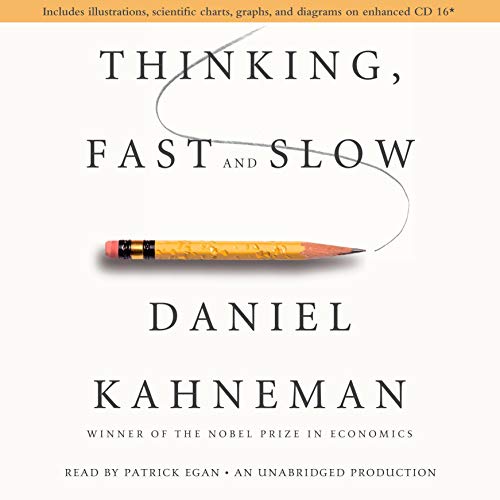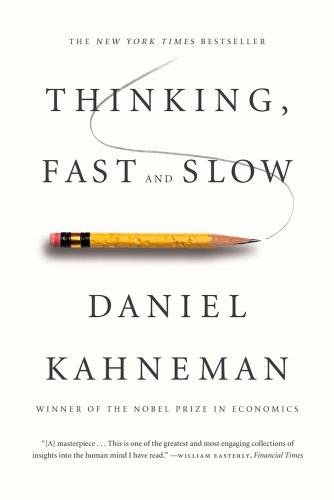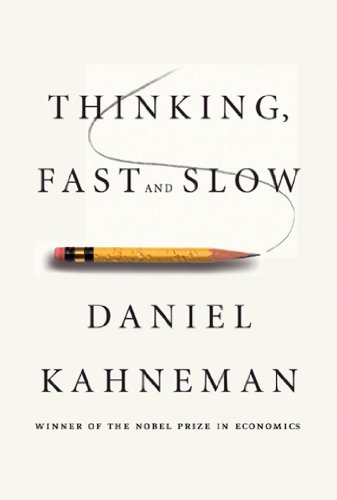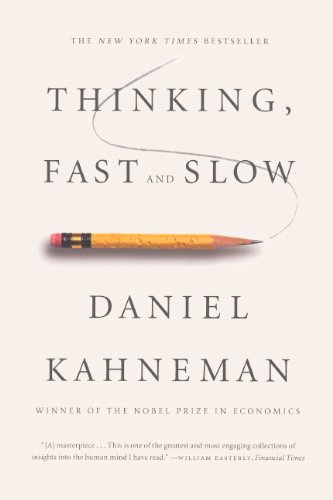-
Thinking, Fast and Slow
Daniel Kahneman, Patrick Egan, Random House Audio
Audible Audiobook (Random House Audio, Oct. 25, 2011)The guru to the gurus at last shares his knowledge with the rest of us. Nobel laureate Daniel Kahneman's seminal studies in behavioral psychology, behavioral economics, and happiness studies have influenced numerous other authors, including Steven Pinker and Malcolm Gladwell. In Thinking, Fast and Slow, Kahneman at last offers his own, first book for the general public. It is a lucid and enlightening summary of his life's work. It will change the way you think about thinking. Two systems drive the way we think and make choices, Kahneman explains: System One is fast, intuitive, and emotional; System Two is slower, more deliberative, and more logical. Examining how both systems function within the mind, Kahneman exposes the extraordinary capabilities as well as the biases of fast thinking and the pervasive influence of intuitive impressions on our thoughts and our choices. Engaging the reader in a lively conversation about how we think, he shows where we can trust our intuitions and how we can tap into the benefits of slow thinking, contrasting the two-system view of the mind with the standard model of the rational economic agent. Kahneman's singularly influential work has transformed cognitive psychology and launched the new fields of behavioral economics and happiness studies. In this path-breaking book, Kahneman shows how the mind works, and offers practical and enlightening insights into how choices are made in both our business and personal lives - and how we can guard against the mental glitches that often get us into trouble. PLEASE NOTE: When you purchase this title, the accompanying PDF will be available in your Audible Library along with the audio.
-
Thinking, Fast and Slow
Daniel Kahneman
Paperback (Farrar, Straus and Giroux, April 2, 2013)Major New York Times bestsellerWinner of the National Academy of Sciences Best Book Award in 2012Selected by the New York Times Book Review as one of the ten best books of 2011A Globe and Mail Best Books of the Year 2011 TitleOne of The Economist's 2011 Books of the Year One of The Wall Street Journal's Best Nonfiction Books of the Year 20112013 Presidential Medal of Freedom RecipientKahneman's work with Amos Tversky is the subject of Michael Lewis's The Undoing Project: A Friendship That Changed Our MindsIn the international bestseller, Thinking, Fast and Slow, Daniel Kahneman, the renowned psychologist and winner of the Nobel Prize in Economics, takes us on a groundbreaking tour of the mind and explains the two systems that drive the way we think. System 1 is fast, intuitive, and emotional; System 2 is slower, more deliberative, and more logical. The impact of overconfidence on corporate strategies, the difficulties of predicting what will make us happy in the future, the profound effect of cognitive biases on everything from playing the stock market to planning our next vacation―each of these can be understood only by knowing how the two systems shape our judgments and decisions.Engaging the reader in a lively conversation about how we think, Kahneman reveals where we can and cannot trust our intuitions and how we can tap into the benefits of slow thinking. He offers practical and enlightening insights into how choices are made in both our business and our personal lives―and how we can use different techniques to guard against the mental glitches that often get us into trouble. Winner of the National Academy of Sciences Best Book Award and the Los Angeles Times Book Prize and selected by The New York Times Book Review as one of the ten best books of 2011, Thinking, Fast and Slow is destined to be a classic.
-
Thinking, Fast and Slow
Daniel Kahneman
eBook (Farrar, Straus and Giroux, Oct. 25, 2011)Major New York Times bestsellerWinner of the National Academy of Sciences Best Book Award in 2012Selected by the New York Times Book Review as one of the ten best books of 2011A Globe and Mail Best Books of the Year 2011 TitleOne of The Economist's 2011 Books of the Year One of The Wall Street Journal's Best Nonfiction Books of the Year 20112013 Presidential Medal of Freedom RecipientKahneman's work with Amos Tversky is the subject of Michael Lewis's The Undoing Project: A Friendship That Changed Our MindsIn the international bestseller, Thinking, Fast and Slow, Daniel Kahneman, the renowned psychologist and winner of the Nobel Prize in Economics, takes us on a groundbreaking tour of the mind and explains the two systems that drive the way we think. System 1 is fast, intuitive, and emotional; System 2 is slower, more deliberative, and more logical. The impact of overconfidence on corporate strategies, the difficulties of predicting what will make us happy in the future, the profound effect of cognitive biases on everything from playing the stock market to planning our next vacation—each of these can be understood only by knowing how the two systems shape our judgments and decisions.Engaging the reader in a lively conversation about how we think, Kahneman reveals where we can and cannot trust our intuitions and how we can tap into the benefits of slow thinking. He offers practical and enlightening insights into how choices are made in both our business and our personal lives—and how we can use different techniques to guard against the mental glitches that often get us into trouble. Winner of the National Academy of Sciences Best Book Award and the Los Angeles Times Book Prize and selected by The New York Times Book Review as one of the ten best books of 2011, Thinking, Fast and Slow is destined to be a classic.
-
Thinking, Fast and Slow
Daniel Kahneman
Hardcover (FarrarStrausGiroux, March 15, 2011)Title: Thinking Fast and Slow <>Binding: Hardcover <>Author: DanielKahneman <>Publisher: FarrarStrausGiroux
-
Fast and Slow
Britta Teckentrup
Board book (Barefoot Books, Oct. 1, 2013)Illustrates pairs of vehicles that demonstrate the differences between fast and slow, including a car and a bike, a rocket and a hot air balloon, and a truck and a wheelbarrow. K
K
-
Thinking, Fast And Slow
Daniel Kahneman (author)
Hardcover (Turtleback, March 15, 2013)Daniel Kahneman, the renowned psychologist an winner of the Novel Prize in Economics, takes us on a groundbreaking tour of the mind and explains the two systems that drive the way we think. System 1 is fast, intuitive, and emotional; System 2 is slower, more deliberative, and more logical. The impact of overconfidence on corporate strategies, the difficulties of predicting what will make us happy in the future, the profound effect of cognitive biases on everything from playing the stock market to planning our next vacation--each of these can be understood only by knowing how the two systems shape our judgments and decision.
-
Thinking, Fast and Slow
Daniel Kahneman
Audio CD (Random House Audio, March 15, 2011)None
-
THINKING FAST AND SLOW Audiobook: Thinking, Fast and Slow
aa
Audio CD (Random House Audio, March 15, 1994)16 CD Unabriged
-
Thinking, Fast and Slow
Daniel Kahneman
Paperback (W H Freeman & Co, April 4, 2013)None
-
Thinking, Fast and Slow
Daniel Kahneman
Paperback (Farrar, Straus and Giroux, March 15, 2011)None
-
Thinking, Fast and Slow 1st
Daniel Kahneman
Unknown BindingWill be shipped from US. Used books may not include companion materials, may have some shelf wear, may contain highlighting/notes, may not include CDs or access codes. 100% money back guarantee.
-
Fast and Slow
Erica Donner
Paperback (Jump!, Aug. 1, 2017)Fast and Slow helps emergent readers understand and differentiate between these opposites while providing them with a supportive first nonfiction reading experience. Carefully crafted text uses high-frequency words, repetitive sentence patterns, and strong visual references to support emergent readers, ensuring reading success by making sure they arent facing too many challenges at once. B
B